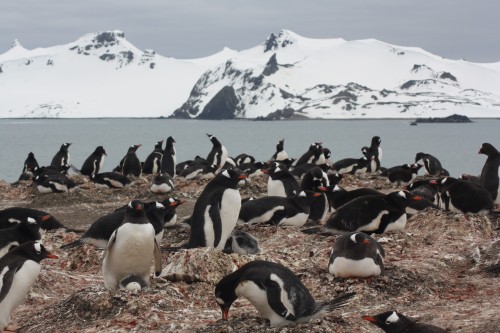PENGUINS ARE EATING MICROPLASTIC IN THE ANTARCTICA

PENGUINS ARE EATING MICROPLASTIC IN THE ANTARCTICA
Microplastics are widespread in the marine environment but are still poorly understood in Polar regions, particularly in the Antarctica. Now, an international study reveals the presence of microplastics in three penguin species from Antarctica and warns about the state of our southern ecosystems.
Now, an international study reveals the presence of microplastics across Antarctica, in three penguin species, chinstrap, gentoo and adélie penguins, and warns about the state of our southern ecosystems.
Researchers analyzed scat samples from chinstrap, gentoo and adélie penguins at breeding colonies across the Antarctic Peninsula and Scotia Sea, over seven seasons. They found microplastics are widespread across years and colonies in Antarctic Peninsula. These particles are mostly polyethylene and polyester, but also, in cellulose fibres. Results shows a similar frequency of occurrence of particles across all colonies, suggesting there is no particular point source for microplastic pollution in the Scotia Sea,
Researchers highlight the need for further assessment of microplastics in this sensitive region of the planet, the potential effects on penguins and other organisms in the Antarctic marine food web.
Photo: Gentoo penguin at Byers Peninsula, one of the locations included in the study. Photo by Andrés Barbosa (MNCN-CSIC)
Reference: Fragão et al., 2021. Microplastics and other anthropogenic particles in Antarctica: Using penguins as biological samplers. Science of The Total Environment.
Photo description: Gentoo penguin colony, with nearly 40 penguins, some of them are nesting in a free-ice area near the water.
More Posts from Allaintoin and Others

LaNada War Jack on the February 1970 cover of Ramparts magazine


Milkmaids of Komintern kolkhoz do a crossword puzzle. Photo by Vsevolod Tarasevich (Tambov oblast, 1957).
THREE NEW SHARK SPECIES THIS WEEK!
The second week of July 2023 something extraordinarily beautiful happened, the findings of 3 new species of sharks for were announced
A new angel sharks species was identified, from the western Indian Ocean on the Mascarene Plateau and off southwestern India in 100–500 m depths, the Lea’s angel shark Squatina leae, was recognized to be different genetically and morphologically distinct from its congeneric species Squatina africanae, following unique morphological features. This species was first detected in 1988 after finding three unusual, small sharks, but till today was completely understood. The angel shark is named after one of the author’s fiancee’s late sister, Lea-Marie Cordt.

- Squatina leae, adult male, in dorsolateral.
Angel sharks are “flatter sharks”, possesing distinctly broad, dorsoventrally flattened bodies, a short snout with large mouth and nostrils, eyes on top of the head close to the large spiracles, very large pectoral fins, and a lateral caudal keel. They’ve evolved to be ambush predators, they lie in wait for prey to pass closely overhead before attacking.
Reference (Open Access): Weigmann et al., 2023. Revision of the Western Indian Ocean Angel Sharks, Genus Squatina (Squatiniformes, Squatinidae), with Description of a New Species and Redescription of the African Angel Shark Squatina africana Regan, 1908. Biology
From North Australia, another species of hornshark is described based on six whole specimens and a single egg case. The painted hornshark Heterodontus marshallae was previously considered to be the same with the zebra bullhead shark another well know bullhead shark from the central Indo-Pacific from Japan to Australia, but genetic and morphological analyses indicated the sharks were different, but looking alike. The painted hornshark is endemic to northwestern Australia and occurs in deeper waters, at 125–229 m below surface.

- Lateral view of two mature female painted hornshark Heterodontus marshallae showing small differences between individuals
The painted hornsharks is named in honour of Dr. Lindsay Marshall www.stickfigurefish.com.au a scientific illustrator and elasmobranch scientist who expertly painted all the sharks and rays of the world for the Chondrichthyan Tree of Life Project.
Reference (Open Access): White et al., 2023 Species in Disguise: A New Species of Hornshark from Northern Australia (Heterodontiformes: Heterodontidae). Diversity.
And from an unidentified shark egg collected from the deep waters of northwestern Australia, in 2011 recently helped researchers identify a new species of deep water cat shark. Called ridged-egg catshark Apristurus ovicorrugatus after its eggs, it was collected in the earlys 90 but remained unknown to date. This sharks presents white eyes, and is small in size, reaching less than a half meter in length. .

- Lateral view of female Apristurus ovicorrugatus before preserved. Photo by CSIRO.
Egg cases belonging to this species had been documented as early as the 1980s, but could not be matched to any species of Australian shark until recently scientists examined a shark specimen of previously uncertain identity in the CSIRO collection.

-egg cases of Apristurus ovicorrugatus. Scale bar is 10 mm
Reference (Open Access) White,et al., 2023 What came first, the shark or the egg? Discovery of a new species of deepwater shark by investigation of egg case morphology. Journal of Fish Biology.


Azulejos
Málaga
Espanha
Fotos cjmn

Citroen 2CV

In the next century, some of our descendants will be living permanently on the Moon and Mars executing almost similar everyday activities as their relations on Earth do. If you are still in doubt of humans living outside the Earth, always remember that space agencies are already putting in the effort to enable our civilization attain such a milestone before the end of this century. Here's how Lunar Gateway will enable space agencies to achieve moon and mars colonization in this century.
Image Credit: https://pin.it/sD2Nsro





SOCEMA Grégoire, 1952. An experimental gas turbine-powered, highly aerodynamic coupé created by French automobile engineer Jean-Albert Gregoire. Powered by a single rotor kerosene-fuelled ‘cematurbo’ engine developing 100 bhp at a 25,000 rpm. The lightweight aluminium frame and bodywork and the aerodynamic shape – a Cx of just 0.19 – enabled a 200km/h top speed which placed it among the fastest cars on the planet in 1952. The project went no further than a single prototype due to the high cost of construction and braking issues; a gas turbine doesn't generate any engine braking effect upon deceleration.
photographs by Perico001 on Flickr
-
 allaintoin reblogged this · 1 year ago
allaintoin reblogged this · 1 year ago -
 allaintoin liked this · 1 year ago
allaintoin liked this · 1 year ago -
 peanutbutterandranch liked this · 2 years ago
peanutbutterandranch liked this · 2 years ago -
 candicedeeznuts69 liked this · 2 years ago
candicedeeznuts69 liked this · 2 years ago -
 deadassdiaspore reblogged this · 3 years ago
deadassdiaspore reblogged this · 3 years ago -
 protostars-depot liked this · 3 years ago
protostars-depot liked this · 3 years ago -
 madmushlove liked this · 3 years ago
madmushlove liked this · 3 years ago -
 gourmentia liked this · 3 years ago
gourmentia liked this · 3 years ago -
 low-level--00 reblogged this · 3 years ago
low-level--00 reblogged this · 3 years ago -
 low-level--00 liked this · 3 years ago
low-level--00 liked this · 3 years ago -
 jimmybear13 liked this · 3 years ago
jimmybear13 liked this · 3 years ago -
 tinysludgemuffinpony liked this · 3 years ago
tinysludgemuffinpony liked this · 3 years ago -
 fancymoonalpaca liked this · 3 years ago
fancymoonalpaca liked this · 3 years ago -
 quailgirlpeep liked this · 3 years ago
quailgirlpeep liked this · 3 years ago -
 naturalistadibordo liked this · 3 years ago
naturalistadibordo liked this · 3 years ago -
 decaypenguin liked this · 3 years ago
decaypenguin liked this · 3 years ago -
 crazycephalopoda reblogged this · 3 years ago
crazycephalopoda reblogged this · 3 years ago -
 gary360808 liked this · 3 years ago
gary360808 liked this · 3 years ago -
 lithraea liked this · 3 years ago
lithraea liked this · 3 years ago -
 moodiesworld liked this · 3 years ago
moodiesworld liked this · 3 years ago -
 shitsngiggles666 liked this · 3 years ago
shitsngiggles666 liked this · 3 years ago -
 windupbirdchronicles liked this · 3 years ago
windupbirdchronicles liked this · 3 years ago -
 insert-meaningful-username liked this · 3 years ago
insert-meaningful-username liked this · 3 years ago -
 penguinfacts reblogged this · 3 years ago
penguinfacts reblogged this · 3 years ago -
 ii-woofers liked this · 3 years ago
ii-woofers liked this · 3 years ago -
 bitsofsciencelife reblogged this · 3 years ago
bitsofsciencelife reblogged this · 3 years ago -
 sincerely-noa liked this · 3 years ago
sincerely-noa liked this · 3 years ago -
 tehh3ytttyyu reblogged this · 3 years ago
tehh3ytttyyu reblogged this · 3 years ago -
 nochetortuga liked this · 3 years ago
nochetortuga liked this · 3 years ago -
 catsinzerogravity liked this · 3 years ago
catsinzerogravity liked this · 3 years ago -
 skittyblackfire reblogged this · 3 years ago
skittyblackfire reblogged this · 3 years ago -
 millievanilly reblogged this · 3 years ago
millievanilly reblogged this · 3 years ago -
 millievanilly liked this · 3 years ago
millievanilly liked this · 3 years ago -
 spiteandcatpics reblogged this · 3 years ago
spiteandcatpics reblogged this · 3 years ago -
 spiteandcatpics liked this · 3 years ago
spiteandcatpics liked this · 3 years ago -
 donut1642 liked this · 3 years ago
donut1642 liked this · 3 years ago -
 skittyblackfire liked this · 3 years ago
skittyblackfire liked this · 3 years ago -
 dyketemnestra reblogged this · 3 years ago
dyketemnestra reblogged this · 3 years ago -
 dyketemnestra liked this · 3 years ago
dyketemnestra liked this · 3 years ago






